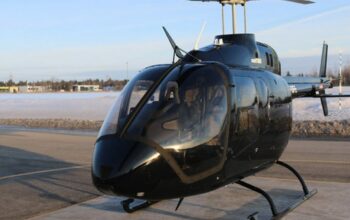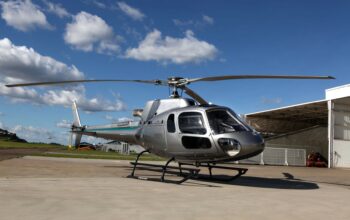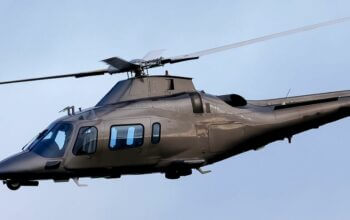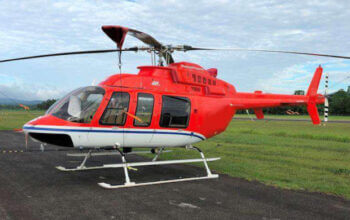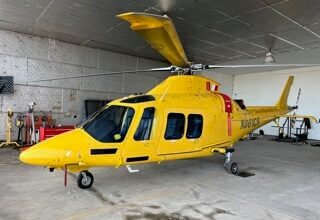Estimated reading time 19 minutes, 48 seconds.
In 1966, Barry Lapointe graduated from British Columbia Institute of Technology (BCIT) as an apprentice AME, and went to work at Harrison Airways in Vancouver. His boss was senior apprentice, Jim Rogers. The two became friends; and in 1971, after both had rotated through other companies, they were once again working together at Kelowna Flightcraft (KF). Lapointe launched KF in 1970 after leaving his position as chief engineer at Air West Airlines (which later became Air BC). Rogers had gone north to the Yukon and the Arctic, working for Great Northern Airways and then Pan Arctic Oils, honing his AME skills on larger turboprop aircraft.
“I wanted Jim to work with me when I started KF,” said Lapointe, company president, with a smile. “But I could not afford him at first. A year later I could, and Jim joined me in Kelowna.”
Lapointe had recognized that the city, located in B.C.’s southern interior, offered many opportunities for an aircraft maintenance operation. Over the years, Lapointe and Rogers expanded Kelowna Flightcraft from a home base in the back of a truck, working on small aircraft, to what eventually became Canada’s largest air freight charter company. KF is also one of the country’s biggest commercial Approved Maintenance Organizations (AMOs), and the company flies, maintains, modifies and provides worldwide engineering support for its own fleet of 70 aircraft, plus dozens of other operators worldwide.
“I was the idea guy, the dreamer,” Lapointe told Canadian Skies. “Jim was the reality guy who made it all happen.” Over the decades, the friends have grown the company in two directions: first as an AMO with a host of military, Canadian and international approvals; and then as an aircraft operator, delivering overnight packages around the world.
The Convair Era
In 1977, KF started one of the first dedicated, cross-Canada air courier services, providing aircraft for Purolator Courier Ltd. The signing of the Purolator contract marked a significant growth point for KF; at first, the company operated piston, and then Allison turbine-powered, Convair aircraft that had been modified from passenger to freighter configuration. Today, KF services the Purolator contract with a fleet of four CV580/5800s (an in-house designed stretch version of the CV580) and 14 B727s that fly Purolator packages from one coast to another, five night per week. Two DC10-30s provide heavy lift for Canada Post, which is the majority owner of Purolator. Every night, the DC10s each typically carry nearly 150,000 pounds of mail (27 containers on the main deck and 18 in the lower baggage pits) on each nightly leg across Canada from Hamilton to Winnipeg, Calgary, and Vancouver – and back again.
KF has an enviable 99.2 per cent dispatch reliability record over the past 12 years with its Purolator fleet. The company has invested heavily in its maintenance infrastructure to achieve this level of reliability, with the intention of being self-reliant and able to provide a premium service at a moment’s notice. Outside customers were sought to maximize the AMO’s extensive heavy aircraft capabilities. Today, KF offers a diverse maintenance and engineering capability, while still keeping its own fleet of aircraft in prime operational condition.
Convair aircraft were always a mainstay of KF’s freight operation, but as the worldwide fleet aged and OEM support decreased, KF made a bold move to ensure the venerable aircraft could continue flying.
In 2001, the company purchased the Type Certificates and Design Approvals for all Convair aircraft (240/340/440/640/580/5800), and it now holds over 100,000 design documents, technical manuals and drawings. KF stocks over 50,000 parts and has the ability to manufacture parts for out-of-production aircraft. The AMO is committed to supporting all Convair operators into the foreseeable future. A unique program to improve the cargo capability of the CV580 by stretching and modernizing the fuselage was also developed by KF, resulting in the CV5800. Both models of Convairs have also been modified as air tankers for fighting forest fires.
The conversion of the 580 to the 5800 consisted of over 16 major improvements, including a 14-foot fuselage extension, glass cockpit conversion, upgraded engines and propellers, a 120-inch cargo door and a reconditioned airframe with a projected life of over 100,000 hours. To carry out the necessary engineering and modifications, KF has an engineering group working on STCs and Service Bulletins, to continually improve and modernize the world fleet of more than 100 aircraft. Recently, the company bought the fleet of former Royal Canadian Air Force (RCAF) CC-109 (Canadair CL-66B) Cosmos, and is repatriating all of them to Kelowna, where they will be converted to CV580s for operation as air tanker firefighters or freighters.
Kelowna Flightcraft’s AMO capabilities have continued to grow. Originally created to support its fleet of Convairs, the maintenance department expanded to support aircraft that were later added to the fleet, including B727-220Fs and DC10s. The AMO now provides maintenance services to other civil and military customers. KF has purchased specialized tooling, including the JT-8D engine overhaul facility formerly owned by MTU in Richmond. The landing gear repair shop includes the chemical vats and specialized equipment required for chrome, nickel and cadmium plating, and can overhaul gear assemblies for many regional and narrow-body airliners. CNC (computer numerical control) and other machine tools necessary for manufacturing out-of-OEM-production parts have also been acquired. KF’s extensive component repair shops work on a variety of items, providing a faster and more economical turnaround. The avionics shop is equipped for working on most avionics systems, and the wire fabrication department can create an assortment of aircraft system harnesses. Added to these capabilities is a highly skilled and motivated workforce.
Base Ops
The two main maintenance bases, Kelowna, B.C., and Hamilton, Ont., total 300,000 square feet of hangar and shop space. The hangar in Hamilton can hold a DC10 and the newest one in Kelowna can accommodate two B757s at the same time. Other smaller hangars provide space for B727s, CV580s and other customer aircraft. One bay has been dedicated as a military aircraft repair facility. There are also nine satellite locations at Vancouver, Calgary, Saskatoon, Winnipeg, Thunder Bay, Toronto, Montreal, Halifax and St. John’s, to provide turnaround maintenance and snag repairs for the many daily Purolator flights.
The last decade has included many significant milestones for Kelowna Flightcraft. In 2002, Jim Rogers retired from KF and sold his interest in the company to long-time partner and friend, Barry Lapointe. [A few years later, Rogers, bored with retirement, launched Flair Air, a privately-owned charter airline also based in Kelowna.]
In 2005, KF led the Allied Wings team, a consortium consisting of itself, Canadian Helicopters, Atlantis Systems and Canadian Base Operators, in a successful bid to secure the 22-year, $1.8 billion pilot training program for the RCAF at Southport, Man.
In 2009, KF was awarded a long term contract by DND to perform heavy maintenance and modernizations on the fixed-wing aircraft that provide search and rescue (SAR) services for B.C., the Yukon and the western NWT. When Canadian Skies visited KF, the military hangar held two RCAF CC-115 Buffaloes and a CC-138 Twin Otter. RCAF 442 Squadron at 19 Wing, Comox, B.C., operates six Buffaloes, and 440 Squadron in Yellowknife, NWT, has four Twin Otters. During our visit, one Buffalo was in for some snag repairs and another was part-way through a Tier 3 heavy maintenance visit. A Twin Otter was in the midst of the extensive Twin Otter Avionics Life Extension Project, replacing 1970s-era avionics with new avionics systems and a modern glass cockpit, designed and certified by KF. The aircraft availability rate for the two military aircraft types has increased to over 70 per cent, including aircraft that are down for scheduled maintenance.
Work at KF is not limited to classic aircraft; it includes projects for modern airlines as well. ConocoPhillips of Alaska had a B737-700 in Kelowna for scheduled maintenance when Canadian Skies visited, and privately-owned airliners and commercial operators such as Canadian North have maintenance and modifications carried out by the company. KF recently signed a long-term structural maintenance contract with WestJet to provide scheduled heavy maintenance on its fleet of B737NG aircraft. As a result, KF will work on approximately 24 aircraft per year over the initial three-year period, with an option for a two-year extension. The WestJet contract will account for an additional 100,000 maintenance hours per year at the Kelowna base, and 30 more related jobs.
KF’s second major WestJet contract involves the fleet-wide modification of the forward three rows of seats to premium seating. The modification involves installing pre-made kits including new seats, modified overhead passenger service units and interior cosmetics. The plan is to carry out these modifications to the entire fleet prior to Christmas 2012. To accommodate this work, KF will run three maintenance lines in Kelowna and one in Hamilton.
“We are always looking for new business opportunities,” said Bryan Akerstream, senior manager, business development and military programs. “We are having great success with the Buffalo program at the depot level, and if the fixed-wing SAR (FWSAR) decision continues to be delayed, we would like to do more of the first and second line maintenance currently carried out by RCAF technicians. The RCAF technicians are often transferred every three to four years, just as they are becoming proficient on one aircraft type.”
If the RCAF extends the expected retirement dates of the Twin Otter from 2020 to 2025 and the Buffalo from 2015 to 2020, these aircraft will require more extensive maintenance to continue flying. An experienced maintenance staff will be critical to their reliability.
The collapse of Aveos Fleet Performance (the MRO that provided maintenance services to Air Canada) in March of this year opened the door for other military maintenance opportunities, such as the RCAF’s Polaris CC-150 program. KF missed capturing the interim contract, which only runs for 10 months, but the company is working on a proposal to secure the five-year contract. The upcoming FWSAR aircraft will also present an opportunity, and KF is pursuing the support program and possible other industrial regional benefits (IRBs), depending on who provides the aircraft.
In addition to AMO operations, KF is a Transport Canada Approved Training Organization, and is certified to provide maintenance instruction on many turbo-prop aircraft, as well as the Boeing 737, and even larger aircraft up to the 767 and DC10.
People and Profits
The success or failure of many companies often relates to their leadership. KF is the oldest civilian aviation company in Canada with the original owner still at the helm. “I think people would be surprised at how small my salary is,” said Lapointe. “As the sole owner of a private company that has always shown a profit, I make all the major decisions without having to answer to shareholders or banks. I don’t need a huge income to just put in the bank; instead, I take a significant portion of the profits and re-invest in the company or distribute them to my employees.”
Profit-sharing is not unknown in many progressive companies; but in the case of KF, “Barry bucks” (a term the employees created much to Lapointe’s mild embarrassment) are handed out in a unique manner. “I feel that every employee is equally important and their job is critical to the success of the company,” explained Lapointe. “Therefore, it doesn’t matter if the employee is a junior AME apprentice, a janitor, a DC10 captain, or has been with the company at least 26 weeks or 20 years; they all get the same amount. To the higher-paid employee it is nice, but to an employee at the lowest end of the pay scale it could mean that they might be able to put a down payment on a home.”
With more than 1,000 employees across Canada, this is not an insignificant amount of money. The thank you cards piled up on Lapointe’s desk certainly show that “Barry bucks” are greatly appreciated.
Many members of the workforce at KF are in for the long haul, with an average of just over 10 years of service; there are also 66 employees who have been with the company longer than 20 years. The average amount of industry experience is approximately 15 years. This stable and experienced workforce not only creates high quality workmanship, but it allows Lapointe to pursue new markets, knowing that his employees are prepared to support any new ventures.
The future looks exciting for Kelowna Flightcraft, with many opportunities ahead for expansion and new business. Forty-two years after it was founded in the back of a truck, the company has grown to become one of the most highly-respected and well-known players in Canadian air cargo and aviation maintenance.
Gary Watson has decades of hands-on experience in both fixed- and rotary-wing aviation maintenance. He recently retired from SAIT Polytechnic in Calgary, Alta., where he had taught avionics and human factors for many years. He can be reached at gary@verticalmag.com.



















